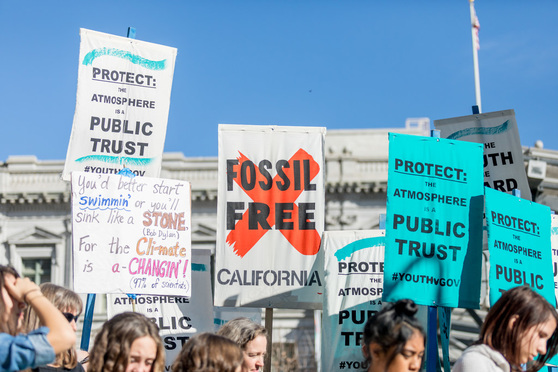In Climate Case, Ninth Circuit Seems Reluctant to Step In
Judge Alex Kozinski, sitting for his first oral argument after the Washington Post reported harassment allegations against him on Dec. 8, appeared to be in the court's minority in a case over whether there's a constitutional right to a livable climate.
December 11, 2017 at 04:44 PM
3 minute read

SAN FRANCISCO—At least two members of a Ninth Circuit panel appeared unlikely to allow an interim appeal to stamp out a lawsuit claiming a constitutional right to be secure from the effects of climate change.
Both Ninth Circuit Chief Judge Sidney Thomas and Judge Marsha Berzon indicated at oral argument Monday that granting the government's unusual mandamus petition in the case could open the floodgates to other litigants who lose out on motions to dismiss.
Government lawyers have argued that a federal judge in Oregon erred last year when she found that plaintiffs in the case—including a group of 21 young people seeking further federal actions to curb climate change—have an “unenumerated fundamental right” to “a climate system capable of sustaining human life.”
DOJ lawyers in both the Obama and Trump administrations have argued that plaintiffs don't have standing to sue, and that there's no due process right to a livable climate.
But on Monday, Berzon told Deputy Assistant Attorney General Eric Grant that the government could appeal once it had something of substance from the court below to appeal and seemed to indicate that she'd be a vote in favor of letting the litigation below run its course. If the Ninth Circuit stepped in too soon, she said the appellate court would be faced with “hundreds” more cases every day asking to review lower court decisions denying motions to dismiss.
Thomas agreed, adding: “We'd be flooded with appeals from people who think their case should have been dismissed by the district court.”
But the lawyer for the plaintiffs, Julia Olson of Wild Earth Advocates, faced pointed questions from the third judge on the panel, Circuit Judge Alex Kozinski, sitting for his first oral argument after the Washington Post reported Dec. 8 that six women said he asked them to view pornography or subjected them to inappropriate comments.
When Olson said she had found no other case where a court of appeals had granted mandamus on standing, Kozinski said that there was “much unprecedented about this case.”
“It may suggest we need to take unprecedented action.”

Later in the argument, Kozinski questioned whether the plaintiffs' young age made them more likely to have standing to sue than any other citizen bringing climate change-related claims against the government. Olson then cited one of Kozinski's own dissents in a case dealing with the foster care system that said “the brunt of the state's policy falls on the children who, after all, have no say in the matter.”
“Quirky,” said Kozinski of his own writing, before noting that the case Olson cited dealt with issues specific to children, where the case at hand has broader issues at play. “Whatever harm they're suffering is the same as everybody else in the country,” Kozinksi said.
After the arguments, Olson and co-counsel Philip Gregory at Cotchett, Pitre & McCarthy crossed the street from the courthouse to a crowd of supporters. The group chanted and sang surrounded by banners and signs reading “Let the Youth be Heard” and “#youthvgov.”
Olson told the crowd that it's time for courts to act as “bulwarks” for citizens against abuses of power.
This content has been archived. It is available through our partners, LexisNexis® and Bloomberg Law.
To view this content, please continue to their sites.
Not a Lexis Subscriber?
Subscribe Now
Not a Bloomberg Law Subscriber?
Subscribe Now
NOT FOR REPRINT
© 2025 ALM Global, LLC, All Rights Reserved. Request academic re-use from www.copyright.com. All other uses, submit a request to [email protected]. For more information visit Asset & Logo Licensing.
You Might Like
View All
Is 1st Circuit the New Center for Trump Policy Challenges?

State Appeals Court Revives BraunHagey Lawsuit Alleging $4.2M Unlawful Wire to China
3 minute read
Fight Over Amicus-Funding Disclosure Surfaces in Google Play Appeal

How We Won: BraunHagey’s $56M Trademark Win Over Molson Coors Upheld by 9th Circuit
8 minute readTrending Stories
- 1Who Are the Judges Assigned to Challenges to Trump’s Birthright Citizenship Order?
- 2Litigators of the Week: A Directed Verdict Win for Cisco in a West Texas Patent Case
- 3Litigator of the Week Runners-Up and Shout-Outs
- 4Womble Bond Becomes First Firm in UK to Roll Out AI Tool Firmwide
- 5Will a Market Dominated by Small- to Mid-Cap Deals Give Rise to a Dark Horse US Firm in China?
Who Got The Work
J. Brugh Lower of Gibbons has entered an appearance for industrial equipment supplier Devco Corporation in a pending trademark infringement lawsuit. The suit, accusing the defendant of selling knock-off Graco products, was filed Dec. 18 in New Jersey District Court by Rivkin Radler on behalf of Graco Inc. and Graco Minnesota. The case, assigned to U.S. District Judge Zahid N. Quraishi, is 3:24-cv-11294, Graco Inc. et al v. Devco Corporation.
Who Got The Work
Rebecca Maller-Stein and Kent A. Yalowitz of Arnold & Porter Kaye Scholer have entered their appearances for Hanaco Venture Capital and its executives, Lior Prosor and David Frankel, in a pending securities lawsuit. The action, filed on Dec. 24 in New York Southern District Court by Zell, Aron & Co. on behalf of Goldeneye Advisors, accuses the defendants of negligently and fraudulently managing the plaintiff's $1 million investment. The case, assigned to U.S. District Judge Vernon S. Broderick, is 1:24-cv-09918, Goldeneye Advisors, LLC v. Hanaco Venture Capital, Ltd. et al.
Who Got The Work
Attorneys from A&O Shearman has stepped in as defense counsel for Toronto-Dominion Bank and other defendants in a pending securities class action. The suit, filed Dec. 11 in New York Southern District Court by Bleichmar Fonti & Auld, accuses the defendants of concealing the bank's 'pervasive' deficiencies in regards to its compliance with the Bank Secrecy Act and the quality of its anti-money laundering controls. The case, assigned to U.S. District Judge Arun Subramanian, is 1:24-cv-09445, Gonzalez v. The Toronto-Dominion Bank et al.
Who Got The Work
Crown Castle International, a Pennsylvania company providing shared communications infrastructure, has turned to Luke D. Wolf of Gordon Rees Scully Mansukhani to fend off a pending breach-of-contract lawsuit. The court action, filed Nov. 25 in Michigan Eastern District Court by Hooper Hathaway PC on behalf of The Town Residences LLC, accuses Crown Castle of failing to transfer approximately $30,000 in utility payments from T-Mobile in breach of a roof-top lease and assignment agreement. The case, assigned to U.S. District Judge Susan K. Declercq, is 2:24-cv-13131, The Town Residences LLC v. T-Mobile US, Inc. et al.
Who Got The Work
Wilfred P. Coronato and Daniel M. Schwartz of McCarter & English have stepped in as defense counsel to Electrolux Home Products Inc. in a pending product liability lawsuit. The court action, filed Nov. 26 in New York Eastern District Court by Poulos Lopiccolo PC and Nagel Rice LLP on behalf of David Stern, alleges that the defendant's refrigerators’ drawers and shelving repeatedly break and fall apart within months after purchase. The case, assigned to U.S. District Judge Joan M. Azrack, is 2:24-cv-08204, Stern v. Electrolux Home Products, Inc.
Featured Firms
Law Offices of Gary Martin Hays & Associates, P.C.
(470) 294-1674
Law Offices of Mark E. Salomone
(857) 444-6468
Smith & Hassler
(713) 739-1250






